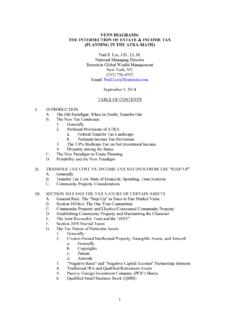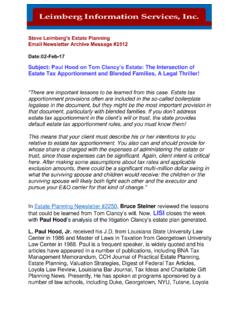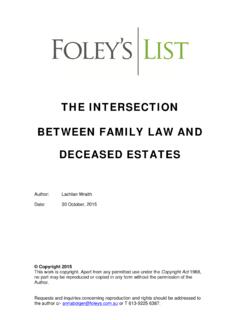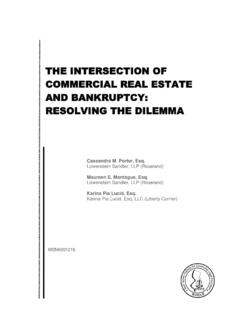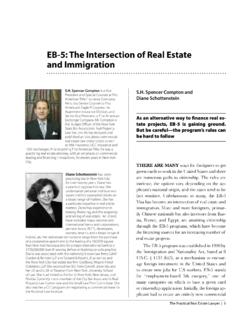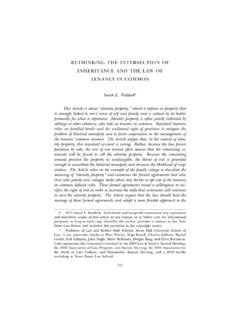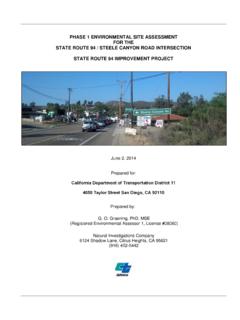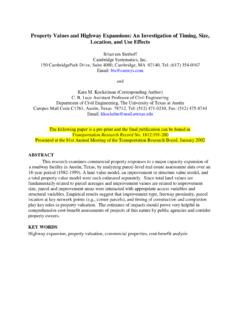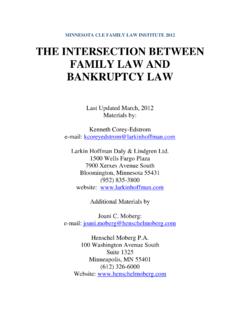Transcription of Legal Issues at the Intersection of Estate Planning and ...
1 | SOLUTIONSL egal Issues at the Intersection of Estate Planning and Elder LawClients in the retirement age bracket are sometimes referred to as the Sandwich Generation by the mainstream media. That is, they are caught between caring for their own children and, at the same time, providing care to their aging parents. This group of individuals has specific Legal needs that should be addressed by an attorney versed in the practice areas of both elder law and traditional Estate Planning . The following is a checklist of some Legal considerations for those individuals approaching retirement age. 1. INCAPACITY Planning Clients approaching their retirement years should be sure to have, at the very minimum, their health care proxies and durable powers of attorney in place and up to date.
2 A health care proxy will appoint an agent to make medical decisions on your behalf if you are unable to do so yourself. Even if you have a spouse, marriage does not grant an individual the right to make medical decisions on a spouse s behalf in the event of a sudden incapacity. Having a proper health care proxy in place will avoid the need to pursue a guardianship in the event of an unforeseen illness or accident. A power of attorney appoints an attorney-in-fact to represent you with regard to financial Planning . Typically, this appointment will take effect as soon as the document is signed. Similar to a health care proxy, this document will avoid the need for your spouse or other trusted individual to have to seek a conservatorship to handle your financial affairs in the event of your unforeseen BEQUESTS AND LIFETIME GIFTS TO CHILDRENC lients with grown children often prefer to leave assets to those children directly in their Estate plans.
3 However, for a variety of reasons, an outright bequest to a child may not always be the appropriate choice. For example, if a child has creditor Issues , is still enrolled in college or graduate school, owns a business, has a shaky marriage, or is not financially astute, it may be more appropriate to leave assets in a discretionary trust for that child. Assets held in a discretionary trust will be managed by a trustee, and distributions will be made only in the event that the trustee deems it an appropriate expenditure of the trust funds. Clients should be aware that in a recent Massachusetts case, Pfannenstiehl v. Pfannenstiehl, the court awarded to the wife in a divorce action assets held in a long-standing trust created by the husband s family and of which he was a beneficiary.
4 I note that the trust at issue in this case provided an ascertainable and not purely discretionary standard for distribution, and this, among other factors, contributed to the court s decision to include the trust assets in the marital Estate during the divorce. A further appeal of this case to the Massachusetts Supreme Judicial Court is expected. However, in the meantime, clients should consider a discretionary trust as a vehicle to leave assets to their children rather than to a trust with an ascertainable standard. Clients should also be aware that any significant lifetime gifts made to children could render the client ineligible for MassHealth long-term care benefits if, for some reason, nursing home care is needed before the five-year ineligibility period created by the gifting has passed.
5 A common misconception is that a gift to a child made pursuant to the IRS annual gift tax exclusion is also allowable for purposes of MassHealth Planning . However, any gift made under the IRS-imposed guidelines would still create an ineligibility period from MassHealth long-term care benefits were the client to apply for benefits within five years of making the gift. 3. Planning TO PROTECT THE PRIMARY RESIDENCE Typically, clients wishing to protect their primary residence from a lien imposed by the state in the event of their nursing home admission and subsequent need for MassHealth long-term care benefits would transfer the residence into an irrevocable trust. Following a period of five years from the date of transfer, the residence would presumably be protected from any future attachment by the state in the event of a nursing home admission.
6 However, recent litigation surrounding irrevocable trusts has left this MassHealth Planning strategy, for the time being, in a state of upheaval. Our firm is currently handling the litigation matter of Roche v. Thorn, which is an irrevocable trust appeal case now pending in the Massachusetts Appeals Court. When decided, the Roche matter should bring some clarity to the use of irrevocable trusts in the MassHealth Planning context. For the time being, clients should take some comfort in the fact that if one spouse were to become ill unexpectedly, the residence can always be protected for the spouse remaining at home through a basic title transfer. However, for those clients who are widowed or otherwise single, it remains an uncertain and difficult time to plan to protect the primary residence from potential long-term care costs.
7 We have been advising clients who are in the appropriate financial position to consider consulting with their financial advisor about the possibility of purchasing long-term care insurance to safeguard their residence and other assets from the possibility of a nursing home spend down. This material is intended to offer general information to clients, and potential clients, of the firm, which information is current to the best of our knowledge on the date indicated below. The information is general and should not be treated as specific Legal advice applicable to a particular situation. Fletcher Tilton PC assumes no responsibility for any individual s reliance on the information disseminated unless, of course, that reliance is as a result of the firm s specific recommendation made to a client as part of our representation of the client.
8 Please note that changes in the law occur and that information contained herein may need to be reverified from time to time to ensure it is still current. This information was last updated in December GUARANTY BUILDING370 Main Street, 12th FloorWorcester, MA 01608 TEL FA X COD1579 Falmouth Road, Suite 3 Centerville, MA 02632 TEL FA X MEADOWS161 Worcester Road, Suite 501 Framingham, MA 01701 TEL FAX PROVIDING FOR AN ELDERLY PARENTO ccasionally, a client will want to provide for an elderly parent in the event of the client s premature demise. It is always recommend that assets left for elderly parents be segregated in either a discretionary trust or third-party supplemental needs trust created for the benefit of the elderly parent.
9 If the elderly parent were to inherit assets outright when the child died and then were to need long-term nursing home care, inherited assets would be subject to a MassHealth spend-down process. By leaving assets to parents in a separate trust, a client can ensure that those funds will not be jeopardized in the event of the parents nursing home admission. 5. IF YOUR SPOUSE IS ALREADY ILLFor those with a spouse who already has a diagnosis of Alzheimer s or dementia or is otherwise in ill health, there are special Estate Planning techniques to consider. Clients with an ill spouse should consider leaving assets into a testamentary trust created under their will for the benefit of their spouse, rather than providing an outright distribution.
10 Assets held in a testamentary trust for a surviving ill spouse will not need to be spent down on that spouse s long-term care needs. In addition, a client should consider revising beneficiary designations to leave assets to the testamentary trust directly, rather than the ill spouse outright. Designations made under a power of attorney or health care proxy may also need to be SOLUTIONSTwo simple words that explain our commitment to you. Being responsive is a critical element in building a strong attorney-client relationship. Whether you are a new or existing client, we ll be quick to respond to your needs with the knowledge necessary to find solutions to your Legal

